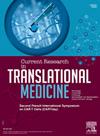Effect of AML-exosomes on the cellular and molecular properties of bone marrow mesenchymal stromal cells: Expression of JAK/STAT signaling genes
IF 3.2
4区 医学
Q2 MEDICINE, RESEARCH & EXPERIMENTAL
引用次数: 0
Abstract
Purpose of study
Despite the various therapeutic options introduced for AML treatment, therapy resistance and relapse are still the main obstacles. It is well known that alterations in the bone marrow microenvironment (BMM) play a crucial role in leukemia growth and the treatment failure of AML. Evidence shows that exosomes alter the components of BMM in a way that support leukemia survival, leading to chemoresistance. In this study, we evaluated the effect of AML exosomes on the biological functions of human bone marrow mesenchymal stromal cells (h BM-MSCs), especially alteration in the expression of the JAK/STAT signaling genes, as a leukemia-favoring pathway.
Method
Exosomes were isolated from the HL-60 cell line and characterized using flow cytometry, Transmission Electron Microscopy (TEM), and Dynamic Light Scattering (DLS) technique. The exosome protein content was assessed using a bicinchoninic acid (BCA) protein assay kit in order to determine the concentration of exosomes. Subsequently, MSCs were treated with varying concentrations of AML exosomes, and data was obtained using MTT, cell cycle, apoptosis, and ki67 assays. Additionally, gene expression analysis was conducted through qRT-PCR.
Result
AML exosomes regulated the viability and survival of MSCs in a concentration-dependent manner. The qRT-PCR data revealed that treatment with AML exosomes at a concentration of 50 μg/mL led to a significant upregulation of JAK2, STAT3, and STAT5 genes in MSCs.
Conclusion
Because the JAK/STAT signaling pathway has been shown to play a role in the proliferation and survival of leukemic cells, our results suggest that AML exosomes stimulate MSCs to activate this pathway. This activation may impede AML cell apoptosis, potentially leading to chemoresistance and relapse.
AML-外泌体对骨髓间充质基质细胞的细胞和分子特性的影响:JAK/STAT信号基因的表达。
研究目的:尽管针对急性髓细胞白血病治疗推出了多种治疗方案,但耐药和复发仍是主要障碍。众所周知,骨髓微环境(BMM)的改变对白血病的生长和急性髓细胞白血病的治疗失败起着至关重要的作用。有证据表明,外泌体改变骨髓微环境的成分,从而支持白血病的生存,导致化疗耐药。在这项研究中,我们评估了急性髓细胞性白血病外泌体对人骨髓间充质基质细胞(h BM-MSCs)生物功能的影响,尤其是对作为白血病有利通路的JAK/STAT信号基因表达的改变:方法:从 HL-60 细胞系中分离出外泌体,并使用流式细胞仪、透射电子显微镜(TEM)和动态光散射(DLS)技术对其进行表征。使用双琥珀酸(BCA)蛋白检测试剂盒评估外泌体蛋白含量,以确定外泌体的浓度。随后,用不同浓度的 AML 外泌体处理间充质干细胞,并使用 MTT、细胞周期、细胞凋亡和 ki67 检测法获得数据。此外,还通过 qRT-PCR 进行了基因表达分析:结果:AML外泌体以浓度依赖性方式调节间充质干细胞的活力和存活率。qRT-PCR 数据显示,用浓度为 50 μg/mL 的 AML 外泌体处理后,间充质干细胞中的 JAK2、STAT3 和 STAT5 基因会显著上调:结论:由于JAK/STAT信号通路已被证明在白血病细胞的增殖和存活中发挥作用,我们的研究结果表明,AML外泌体可刺激间充质干细胞激活这一通路。这种激活可能会阻碍急性髓细胞白血病细胞的凋亡,从而可能导致化疗抵抗和复发。
本文章由计算机程序翻译,如有差异,请以英文原文为准。
求助全文
约1分钟内获得全文
求助全文
来源期刊

Current Research in Translational Medicine
Biochemistry, Genetics and Molecular Biology-General Biochemistry,Genetics and Molecular Biology
CiteScore
7.00
自引率
4.90%
发文量
51
审稿时长
45 days
期刊介绍:
Current Research in Translational Medicine is a peer-reviewed journal, publishing worldwide clinical and basic research in the field of hematology, immunology, infectiology, hematopoietic cell transplantation, and cellular and gene therapy. The journal considers for publication English-language editorials, original articles, reviews, and short reports including case-reports. Contributions are intended to draw attention to experimental medicine and translational research. Current Research in Translational Medicine periodically publishes thematic issues and is indexed in all major international databases (2017 Impact Factor is 1.9).
Core areas covered in Current Research in Translational Medicine are:
Hematology,
Immunology,
Infectiology,
Hematopoietic,
Cell Transplantation,
Cellular and Gene Therapy.
 求助内容:
求助内容: 应助结果提醒方式:
应助结果提醒方式:


